In a world where digital screens have become our windows to the world, a new breed of storytellers is emerging, captivating audiences and reshaping the marketing landscape. These are the influencers, the modern-day bards who weave tales of products and brands into the fabric of our social media feeds. In India, influencer marketing is experiencing an unprecedented boom, and it’s not just the big players who are reaping the rewards. Micro, small, and medium enterprises (MSMEs), the backbone of the Indian economy, are harnessing the power of these digital narrators to reach dizzying heights.
This seismic shift in marketing strategy is not merely a trend; it’s a calculated response to the evolving digital landscape and the changing dynamics of consumer behaviour. As traditional advertising methods lose their lustre in the face of an increasingly digital savvy audience, influencer marketing has emerged as a beacon of authenticity, engagement, and measurable results.
Rise of influencer marketing in India
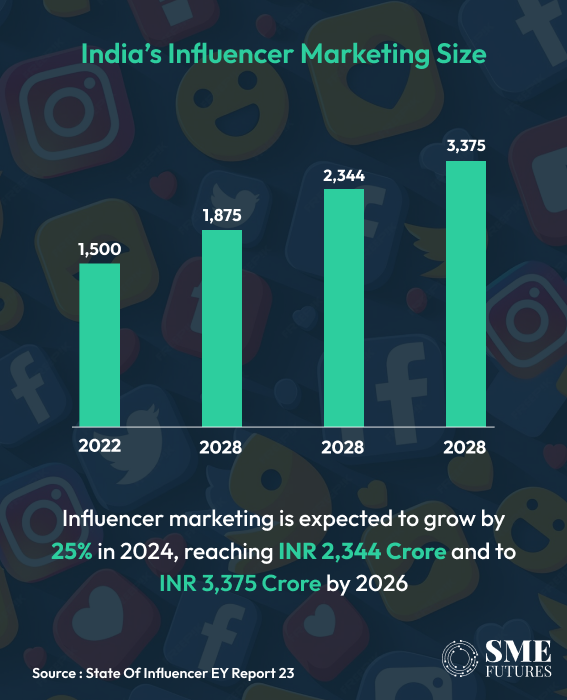
India’s digital transformation has been nothing short of remarkable. With a burgeoning internet user base exceeding 850 million and the widespread adoption of smartphones, the country has become a fertile ground for the creator economy. Social media platforms like Instagram and YouTube have evolved into bustling virtual marketplaces, where influencers wield significant influence over consumer opinions and preferences.
This digital revolution has not only empowered creators but has also opened up new avenues for businesses, particularly MSMEs, to connect with their target audiences. As the EY 2023 report on the state of influencer marketing in India aptly states, “As 50% of the time spent on mobile phones is on social media platforms, marketers need to consider influencer marketing as part of their overall communication strategy.” The report also highlights that the Indian influencer marketing industry is expected to reach Rs 3,375 crores by 2026, growing at an impressive CAGR of 18%. This surge is fuelled by several factors, including the country’s rapid digital transformation, increasing disposable incomes, and a shift in consumer trust towards influencers.
Why MSMEs are choosing influencers over tradition
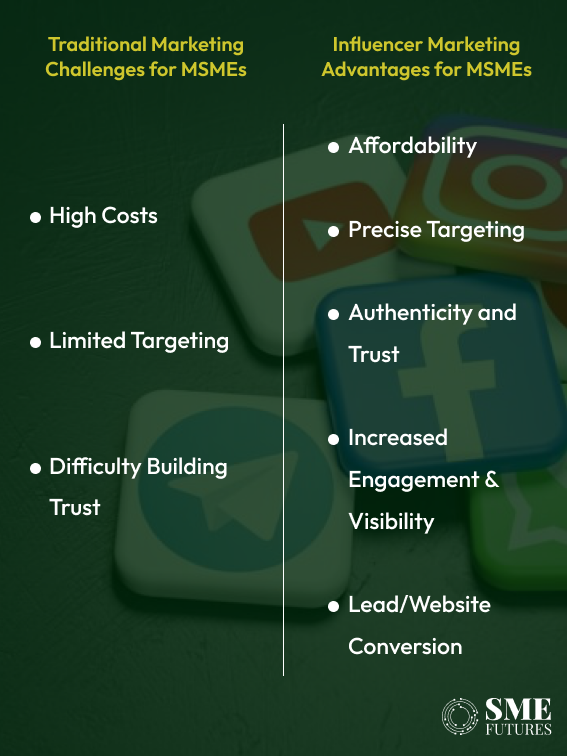
For MSMEs, traditional marketing methods often present formidable challenges. These methods can be financially burdensome, lack precise targeting capabilities, and struggle to establish genuine connections with consumers. Conversely, influencer marketing offers a more affordable, targeted, and authentic approach.
Sweety Vaghani, Founder and Managing Director of Roomy’s by Diagliter, articulates the appeal of influencer marketing for MSMEs, “Influencers are a rendering new marketing tool, be it through effective publicity, endorsement, user-generated content or paid advertising. Brands require an audience to create relevancy, and that audience has to advance into a community. Influencers already have a segmented community that caters to the brands’ needs so it’s quite possible to ditch the traditional marketing approach and divert to influencer campaigns that not just derive engagement and visibility but target lead/ website conversion.”
The EY 2023 report reveals that 75% of brands consider influencer marketing as a part of their marketing strategy, with 61% focusing on driving awareness and engagement through influencers. This highlights the growing recognition of influencer marketing’s potential to reach and resonate with target audiences. Additionally, the report found that 56% of brands invested more than 2% of their marketing budgets on influencer marketing, indicating a substantial financial commitment to this strategy.
Power of micro-influencers and data-driven decisions
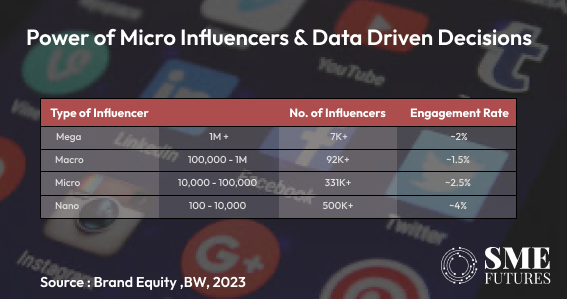
While mega-influencers with massive followings command attention, MSMEs are increasingly recognising the value of micro-influencers. These individuals, with follower counts typically ranging from 10,000 to 100,000, often boast higher engagement rates and a more dedicated and loyal following. Their recommendations are perceived as more genuine and trustworthy, making them ideal partners for MSMEs seeking to build brand credibility and foster meaningful connections with their target audience.
The EY report supports this trend, stating that “47% of brands preferred driving influencer campaigns with micro and nano influencers due to lower cost per reach.” This indicates a growing preference for influencers who offer a more personalised and relatable approach, aligning with the values and aspirations of MSMEs.
One of the key advantages of influencer marketing is its measurability. Businesses can track various metrics, such as engagement rates, click-through rates, and conversions, to assess the effectiveness of their campaigns. This data-driven approach allows for continuous optimisation and ensures that marketing budgets are allocated efficiently.
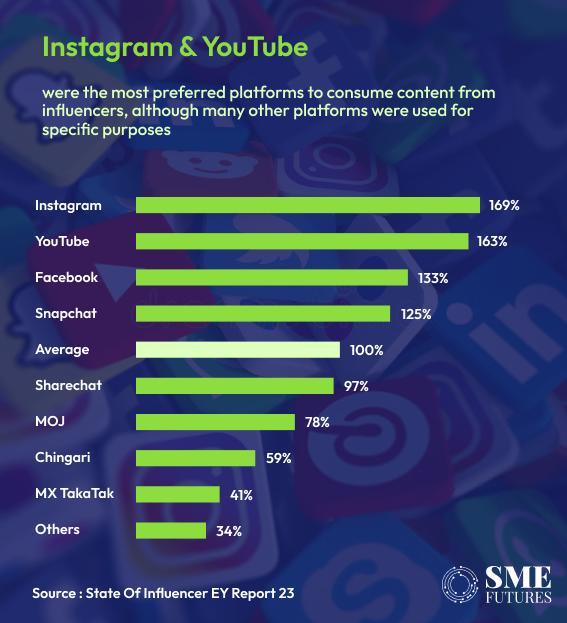
Prady, the CEO of NP Digital India, emphasising the importance of data in influencer marketing, says, “By leveraging advanced tracking tools, we monitor the performance of influencer campaigns in real-time. We analyse metrics such as reach, engagement, conversions, and ROI to optimise strategies continuously.”
Navigating complexities and ensuring authenticity
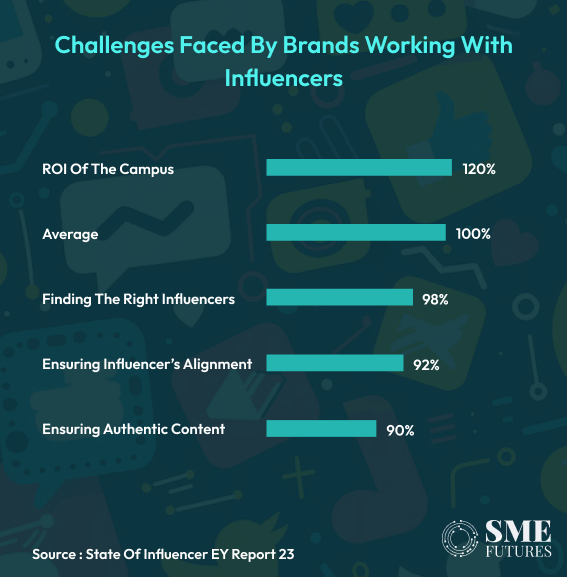
While influencer marketing offers immense potential, it’s not without its complexities. Identifying the right influencers, ensuring authenticity and transparency in collaborations, and navigating the evolving regulatory landscape are some of the challenges that businesses and influencers face.
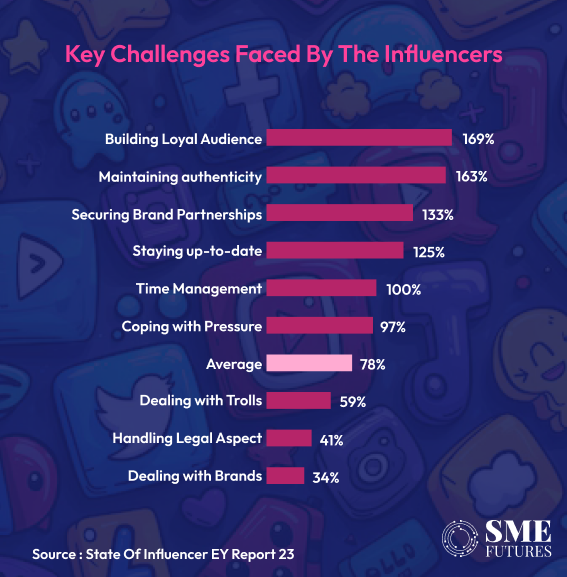
Siddhyesh Narkar, CTO at Wondrlab India, highlighting their commitment to authenticity and data-driven decision-making, says, “Extensive data computing practices are needed to ensure that clients have access to accurate and up-to-date insights on reach, impressions, engagement, and audience demographics, enabling them to make informed decisions. We leverage our comprehensive technology platform to analyse key metrics such as reach, impressions, engagement, and audience metrics. This data-driven approach ensures that we match influencers with our clients’ specific needs and target audiences.”
Nandita Sood, Founder & CEO of KERTUS, providing a nuanced perspective on the future of influencer marketing, says, “The influencer marketing landscape in India is currently booming, but from my perspective, it resembles a bubble poised to burst… The key will be maintaining authenticity and finding novel ways to connect with audiences beyond traditional paid partnerships.”
She also emphasises the importance of Return on Investment (ROI), stating, “An unwavering commitment to delivering ROI should be fostered within companies and it could be something which truly sets it apart. We recognise that our clients come to us with specific goals, and we take pride in consistently exceeding their expectations.”
Road ahead: Embracing innovation and authenticity
The future of influencer marketing in India is undoubtedly bright, but it’s also evolving rapidly. As consumers become more discerning, the emphasis on authenticity and genuine connections will only intensify. Emerging trends like live video commerce, the growing popularity of regional influencers, and the integration of AI-generated content are reshaping the landscape.
Siddhant Malhotra, Founder of Not Knowing Podcast, underlining the transformative power of influencer marketing, says, “Influencer marketing is reshaping digital marketing in India. This strategy uses well-known personalities to boost brand visibility and engagement. It is crucial for companies aiming to strengthen their market presence.” He also notes the importance of staying relevant and authentic in the ever-changing landscape of influencer marketing.
“The influencer marketing landscape in India has seen significant growth and transformation. This evolution has positively impacted my content creation and brand collaborations by opening numerous opportunities for partnerships across various industries,” says Priya Sachdeva, Founder, Trending Diary.
Influencer marketing has emerged as a game-changer for MSMEs in India. It offers a cost-effective, targeted, and authentic way to connect with consumers in the digital age. While challenges exist, the opportunities for growth and innovation are immense. As the industry matures, we can expect to see even more sophisticated strategies and creative collaborations that redefine the way brands and consumers interact.
“The future of influencer marketing in India will see a rise in AI influencers, greater emphasis on authenticity, and a shift towards micro and nano influencers in Tier 2 and Tier 3 cities. To prepare for these changes, Opportune is investing in AI and machine learning technologies to refine our influencer selection process and campaign analytics,” says Vandana Verma, Co-founder and Managing Partner, Wondrlab India.
For MSMEs, the message is clear: embrace influencer marketing, adapt to the evolving landscape, and leverage the power of authentic voices to tell your brand story. The future of marketing in India is here, and it’s all about building genuine connections in the digital realm.











